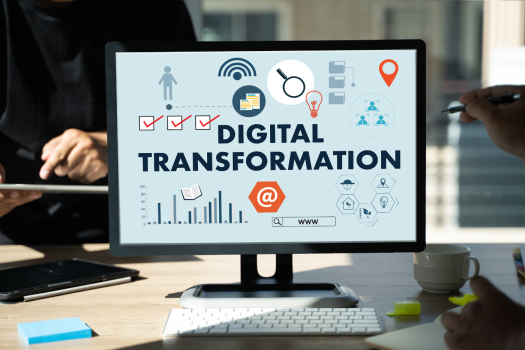+91-78382-22255
support@xcelmarketing.in
BLOG'S
Table of Contents
Published on: April 30, 2025 06:19 PM
What is Digital Transformation? Leveraging AI

Introduction
The world is transforming at a never-before-seen speed, as the pace at which technology evolves continues to race ahead. Of all the transformative changes companies are currently experiencing is digital transformation. But precisely, what is digital transformation and how is digital transformation connected to AI artificial intelligence?
In this in-depth article, we'll explore the concept, benefits, strategies, and technologies behind digital transformation, with a special focus on artificial intelligence in business. By the end, you'll not only “define digital transformation”, but also understand how it's shaping the future of global enterprises.
What is Digital Transformation?
Let's begin with the basics what is digital transformation?
Digital transformation refers to the alignment of digital technology across an organization's entire enterprise, leading to fundamental changes in how businesses operate and deliver value to customers. It's a matter of much greater scope than digitizing business processes—rather, it's about rethinking business models, strategies, and operations to harness the potential of technology and data.
To define digital transformation more formally: it's a cultural, organizational, and operational transformation via the smart integration of digital technologies, processes, and competencies at every level and across every function within an organization.
This transformation keeps businesses competitive in a more digitally oriented world.
The Evolution of Transformation Digitalization
Terms such as transformation digitalization and digitalization transformation are usually used interchangeably, but they have subtle distinctions:
Digitalization transformation highlights the way digital technologies entirely transform and enhance old ways of working, making them more effective and creative.
Transformation digitalization indicates the wider change in attitude and business approach facilitated by digital technology.
Both are essential components of any business transformation, ensuring that organizations adapt to the needs of today's consumers and new technologies.
Why Digital Transformation Matters in 2025 and Beyond?
Companies that do not adopt "digital transformation" are in danger of becoming irrelevant. With new technology such as AI, big data, cloud computing, and IoT leading to disruption, old-school business models need to change.
Key Drivers:
- Customer Expectations: Consumers expect personalized, frictionless digital experiences.
- Market Competition: Competitors with technical expertise are making inroads.
- Operational Efficiency: Automation saves costs and improves accuracy.
- Data Utilization: Companies are using data to make better decisions.
By integrating AI and business processes, businesses are able to address these requirements more effectively and grow more quickly than ever.
What is AI? AI Meaning and Relevance Today:
Let's get that out of the way before going deeper: what is AI?
AI or artificial intelligence, means systems or machines that replicate human intelligence in order to do tasks and iteratively improve themselves from the data they gather.
The AI meaning cuts across several technologies like machine learning, natural language processing (NLP), deep learning, and robotics. These machines examine large quantities of data, identify patterns, make choices, and even learn through experience.
AI Artificial Intelligence in the Business:
Having AI artificial intelligence involved in business operations is no longer something out of the future—it's here today. When we talk about "artificial intelligence in business", we mean the application of intelligent machines and software to automate processes, learn from data, and improve customer experiences.

Popular Use Cases:
- Predictive Analytics: For forecasting customer behavior and trends.
- AI Chatbots: 24/7 customer support for better service.
- Sales & Marketing Automation: Automating campaigns for improved engagement.
- Fraud Detection: In banking and e-commerce.
- AI in HR: Candidate screening automation and employee retention.
This convergence of AI in business processes is the foundation of a more intelligent, more agile organization.
Digital Transformation Technology: Enabling the Change
Digital transformation success depends on having the correct stack of technologies. These technologies are enablers that enable businesses to drive higher agility, velocity, and customer satisfaction.
Core Digital Transformation Technologies
- Cloud Computing: Facilitates scalable, on-demand computing resources.
- Big Data Analytics: Converts raw data into usable insights.
- Internet of Things (IoT): Links devices to capture real-time operating data.
- Blockchain: Provides security and transparency for transactions.
- AI & Machine Learning: Drives predictive decision-making and process automation.
Organizations become future-ready by implementing these digital transformation technology solutions.
Advantages of Digital Transformation
Let us examine some of the most important advantages of digital transformation and how they help different industries:

1. Increased Operational Efficiency
Automation of routine tasks results in lower costs, less error, and enhanced productivity.
2. Better Customer Experience
From targeted marketing to real-time assistance, AI and business partnerships build remarkable digital experiences.
3. Quicker Decision-Making
Data analytics gives insights that enable quicker and more accurate decisions.
4. Innovation Enablement
Organizations are able to quickly test and deploy new products or services.
5. Increased Agility
Digital companies are able to shift direction more quickly to changes in the market.
Adopting digitalization transformation guarantees that companies remain agile in an era where change is a given.
How to Design a Winning Digital Transformation Strategy?
Every firm requires a custom digital transformation strategy. It's not a matter of imitating what others are doing—it's about matching digital activities with business objectives.
How to Create a Winning Strategy?
- Assess the Current State: Know where your business is online.
- Establish Clear Objectives: Align digital objectives with business KPIs.
- Determine Technological Requirements: Choose the correct tools and platforms.
- Invest in Talent and Training: Upskill staff to adopt change.
- Promote a Digital Culture: Encourage openness, innovation, and agility.
When your digital transformation strategy is properly framed, incorporating AI artificial intelligence is an easy and effective next step.
Some Examples of AI Business Transformation
Across sectors, businesses are redefining success with AI artificial intelligence and digital transformation:
- Healthcare: AI-powered diagnostics and robotic surgeries are enhancing patient outcomes.
- Retail: AI is making shopping experiences more personalized and inventory management real-time.
- Finance: Robo-advisors and AI-driven fraud detection systems improve service and security.
- Manufacturing: AI-based predictive maintenance minimizes downtime and saves money.
These are not merely examples of tech adoption—they're unequivocal indicators of true business transformation fueled by digital tools and AI.

The Connection between Digital Culture and Transformation
Technology will not be the sole driver of success. There needs to be a digital culture—one that is conducive to innovation, open to risk-taking, and fostering collaboration. Leaders need to pay attention to this mind-set as much as they concentrate on selecting the right digital transformation technology.
This human touch makes AI in business a force for empowerment, rather than disruption.
And Digital Transformation: What Comes Next?
In the future, and digital transformation keeps on changing. The next step could be:
- Hyperautomation: Automating all possible business processes with AI and ML.
- Augmented Intelligence: Blending human judgment with AI data to make more informed decisions.
- Ethical AI: Making AI systems transparent, fair, and accountable.
To stay ahead, companies will have to keep reeling back on their digital transformation strategy and keep adapting to new trends and customer expectations.
Conclusion: Leading the Digital Revolution with AI
In short, what is digital transformation? It's the rebirth of business in the digital era—driven by intelligent technologies and people-first thinking.
By strategic adoption of digital transformation technology, and a strong knowledge of AI meaning, companies can future-proof their business. Adopting AI artificial intelligence is no longer a choice—it's the key to innovation, growth, and long-term competitive advantage.
Companies embracing both digitalization transformation and artificial intelligence in business today are positioning themselves to lead tomorrow.